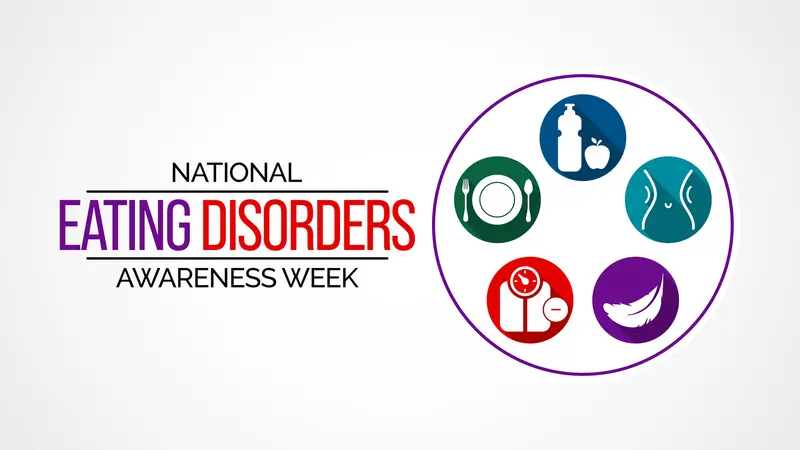

Chronic Conditions and Diseases

Chronic Conditions and Diseases
Overlooked Factors in Eating Disorders: Infections, Inflammation, and Gut Bacteria
Mindset may not always be the root cause of eating disorders; new evidence suggests that inflammation, infections, and gut bacteria may also play a role. Many factors can contribute to the development of an eating disorder, including biological, psychological, and social factors (i.e., the biopsychosocial model in psychology). While many people are aware of the psychological and social components (e.g., perfectionist tendencies, cultural beauty standards, social media use, family and social pressures), the biological components are often overlooked. These key elements to recovery include genetics, inflammation and infections, and microbiome and gut health.
While many people are aware of the psychological and social components… the biological components are often overlooked. These key elements to recovery includes genetics, inflammation and infections, and microbiome and gut health.
Infections & Inflammation
Researchers have noticed that some people can develop eating disorders after getting an infection, many of them children with PANS or PANDAS, a condition in which an infection can trigger obsessive-compulsive disorder (OCD) and tics, as well as sudden changes in eating attitudes and behaviors. Some reports found that eating disorder behaviors decreased after antibiotic treatment for infectious triggers.
A Massachusetts General Hospital study evaluated more than 500,000 teenage girls in Denmark and found that those who had been hospitalized for a serious infection or had completed more than three courses of antibiotics were 39% more likely to develop eating disorders.
Some possible mechanisms by which an infection could cause cognitive and behavioral changes associated with eating disorders are:
- Direct effects on the brain—Certain infections such as toxoplasmosis are more likely to result in the development of OCD or OCD-related tendencies, both of which are common in patients with eating disorders.
- Inflammation and autoimmunity—Sometimes after an infection, the immune response can result in widespread inflammation and even autoimmunity to the brain. In children with PANDAS, strep antibodies can attack the brain and lead to obsessions, compulsions, and disordered eating.
- Appetite suppression—Some infections reduce appetite, which may lead patients to skip meals. If they are praised for weight loss, this may encourage further disordered eating.
Gut Bacteria
Alterations in the gut microbiome can affect how a person’s body functions: How they think, feel, behave, and interact with others. The gut microbiome is critical not only to regulating mood and behavior, but it also plays a vital role in regulating metabolic function, appetite control, and weight. Antibiotics can decrease the diversity and number of good bacteria in the gut, which can contribute to changes in emotions and behavior.
A study showed that patients with anorexia had lower diversity of gut bacteria than healthy individuals, and that the less diverse the gut microbiome, the more depressed and anxious the patients were. The researchers also found that as a patient with anorexia began eating again, their gut bacteria diversity was partially restored, which aided in recovery.
A 2015 study from France looked at mice who had an inflammatory reaction to a protein made by gut bacteria that caused eating disorders in the mice. The gut bacteria that triggered this immune response is similar in structure to the satiety hormone alpha-Melanocyte-stimulating hormone (a-MSH). When the immune system attacks gut bacteria similar to a-MSH, it also attacks the a-MSH due to their structural similarity. This immune response can then dysregulate signals around feeding, energy usage, and anxiety.
For patients with evidence of biological root causes such as infections, inflammation, or gut bacteria, a whole-body approach to treatment may make all the difference in recovery.
Treatment Approaches
One study found that about two-thirds of patients hospitalized with an eating disorder were still suffering from their condition 10-20 years after their initial diagnosis. For patients with evidence of biological root causes such as infections, inflammation, or gut bacteria, a whole-body approach to treatment may make all the difference in recovery.
In addition to therapy and medications, this type of approach may include:
- Nutrition and dietary changes to support gut health.
- Treatments that address relevant biological imbalances (e.g., inflammation, blood sugar regulation, mineral deficiencies).
- Testing for infections based on medical history and physical exam, and appropriate treatment when needed.
- Yoga, meditation, biofeedback, or neurofeedback to manage stress and anxiety.
Nutritional strategies to support the brain and gut microbiome include:
- Eliminating processed carbs and sugars, which can trigger addictive tendencies metabolically.
- Keeping blood sugar stable to curb cravings, food obsessions, and relentless hunger. This may mean initially eating small, frequent meals that include protein.
- Building a diet of diverse vegetables, which will increase the diversity of the gut microbiome, promoting psychological health and stability.
- Supporting neurotransmitters that affect mood, thoughts, behavior, energy levels, and other aspects of feeling and functioning better. Both serotonin and dopamine have been shown to play a role in eating disorders, and there is a strong possibility that patients with eating disorders may be deficient in either one or both of these important neurotransmitters.
A better understanding of the role biological components play in eating disorders, including infections, inflammation, and gut bacteria, can help forge new directions in treatment.
REFERENCES
Chandra, S. (2021, June 7). Overlooked causes of eating disorders: Inflammation & infections. https://www.chandramd.com/blog/eating-disorders-causes-infection/#treatment=
The Florida Center for Functional Medicine (n.d.). Gut bacteria play a role in eating disorders like anorexia. https://www.floridafunctionalmedicine.com/gut-bacteria-play-a-role-in-eating-disorders-like-anorexi…;


 By
By







